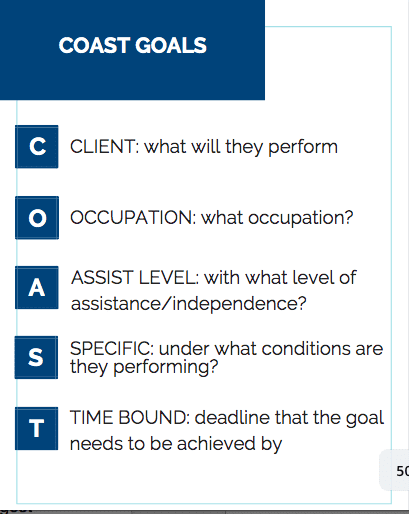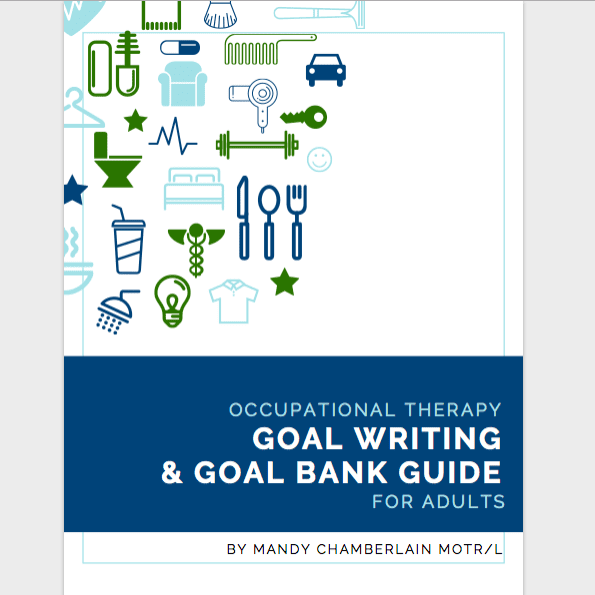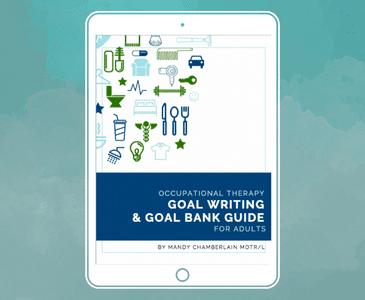We have all been there, trying to figure out what is the best and easiest way to make OT goal writing successful, but why is this sometimes so hard?
UGH 😫
See, I was randomly looking through the Occupational Therapy Treatment Ideas & Information Facebook page the other day (it is a HUGE group with tons of ideas!), when I came across a post about an OT that was talking about difficult it was for her to write goals beyond the typical ADL.
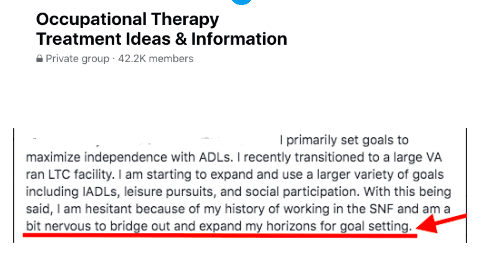
So I wanted dig in and explore what are some of the most common reasons that OT goal writing is such a pain in the butt, what we need to do in order to make our OT goals more skilled, collaborative and client centered, and share some of my favorite resources (including the OT Goal Writing and Occupational Therapy Goal Bank for adults ebook and Workbook – a complete must have to write rock solid, client-centered OT goals, check it out below ).
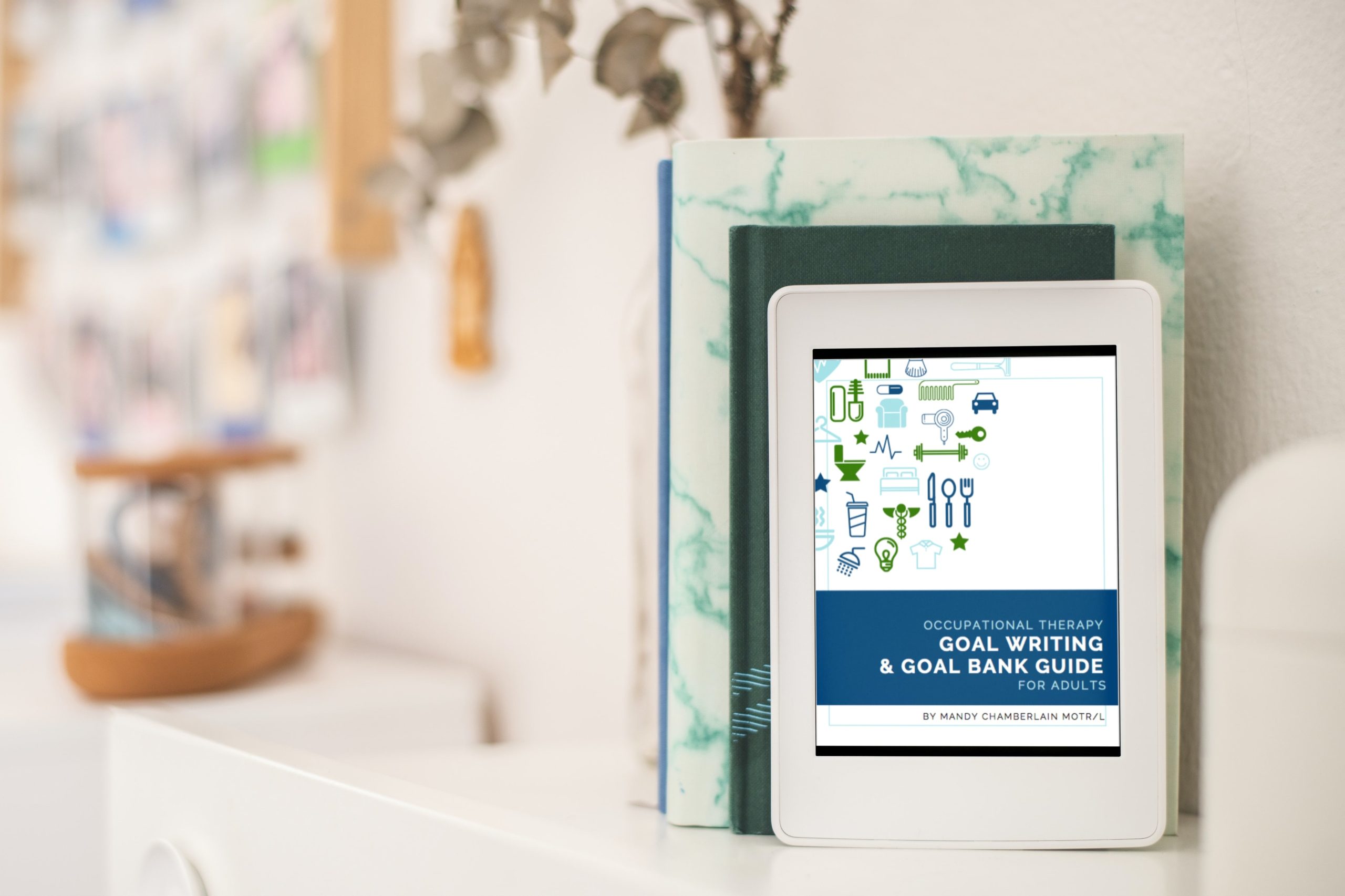

Let’s Dig Into Why Writing Goals Can Be Challenging:
Problem 1: We are limited by the electronic medical record we use.
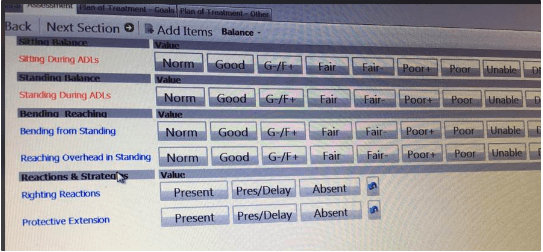

Let’s be honest, we are at the mercy of the software that we are given!
It is hard when all you are doing is trying to write goals based on the information that you have collected during your evaluation, but all you end up doing is navigating through endless dropdowns and trying to “fit” your patient into the software.
It’s a balance between trying to create OT goals that are client centered, are relevant to the clients self directed goals, goals based on what insurance will pay for and what we see as occupational therapists that need to be addressed in order to accomplish all of this! 😱


Problem 2: There are many different ways to actually accomplish goals.
It seems like every OT setting, facility and school has a different way of teaching this, with some of the most common being:
- COAST (my all time fav!): Client, Occupation, Assist level, Specific, Time bound
- OT SMART Goals: Significant, Measurable, Achievable, Relates to person, Time based
- RHUMBA: Relevant, How long, Understandable, Measurable, Behavioral, Achievable
Problem 3: We aren’t always taught (or maybe it just gets lost over time) to use outcome measures or use our initial evaluations to guide our goals.
We end up writing OT goals that are:
- not the most client-centered,
- hard to achieve,
- using too many measurements to make the goal difficult to achieve or
- labeled as “not functional.”
What is an example of a written goal?
“NEEDS SOME IMPROVEMENT” OT GOAL WRITING:
Within 2 weeks, the patient will perform upper body dressing (UB) independently (I) with use of adaptive equipment (AE) while sitting edge of bed (EOB) with “good” dynamic sitting balance.
Because this OT goal writing example has so many conditions, it will be very difficult for the patient to actually meet all of these conditions and look like they are progressing, even if they technically are. Maybe the patient does perform UB dressing with a piece of adaptive equipment independently (which would actually be modified independent, not independent) sitting at the edge of the bed, but with only fair+ balance. They would not meet the goal.
Break it down!
“DEFINITELY CLEAR AND TO THE POINT” OT GOAL WRITING:
Within 2 weeks, the patient will perform UB dressing (I) with “good” dynamic sitting balance.
This OT goal writing example has each part of a COAST goal (Client, Occupation, Assist level, Specific, Time bound), which makes it not only makes it clear what the patient needs to work on, what occupation is being addressed, how much assistance is expected, and how long it will take for the patient to actually achieve this goal.
What are good occupational therapy goals?
Occupational therapy is a profession focusing on helping a client perform the occupations they need and want to do. OT goal writing should be collaborative, client-centered and follow one of the recommended goal formats, such as the COAST method.
Some things to keep in mind are:
#1: Use outcome measures in your goals, especially in short term goals or goals that are difficult to quantify or measure
It’s really important to include outcome measures when setting goals, especially short term goals, and there are some great reasons for that. These measures give us a standard and objective way to see how our clients are progressing and whether the interventions we’re using are effective. They become especially handy when we’re dealing with objectives that aren’t easy to measure directly.
For instance, if a client’s short-term goal is to improve their hand function after a stroke, we can use a tool like the Jebsen-Taylor Hand Function Test. This test breaks down hand functions into specific actions, like picking up small objects or page turning. By doing this, we establish a clear starting point and can precisely track how our client is progressing towards their goal.
Likewise, when we’re working on more subjective goals, like boosting a client’s self-confidence, etc in daily activities so they can participate in them regularly, we can turn to standardized self-report scales such as the Occupational Self-Assessment (OSA).
These scales allow us to measure changes over time objectively. Plus, they contribute to the entire goal-setting process by making sure that our goals are not just realistic but also achievable. So, by using outcome measures, we’re not only helping our clients but also making our approach to goal-setting more effective and evidence-based.
#2: Get a good understanding of what should actually be in a Long Term and Short Term Goals
Let’s dive into the importance of distinguishing between long-term and short-term goals in our work in occupational therapy. This distinction is a key factor in crafting effective goals. Long-term goals typically encompass the broader objectives that our clients strive to achieve over an extended period, often representing the ultimate outcome of their therapy aka occupations.
These goals are ambitious yet attainable and serve as a guiding light throughout the entire treatment process, offering a clear sense of direction.
Long term goal example breakdown:
Let’s consider a client who’s recovering from a stroke. Their long-term goal might be something like “to be able to use the toilet on my own.” This goal is comprehensive and can involve various areas of intervention to help the client achieve it successfully.
Short term goal example breakdown:
Conversely, short-term goals are the smaller, specific steps or milestones that contribute to the realization of long-term (many times occupation focused) objectives. Think of them as building blocks – when accomplished sequentially, they lead to the fulfillment of the overarching goals. Building on our example, a short-term goal for this client could be focusing on increasing internal rotation so they are able to reach the back of their pants so they can accomplish the long term goal of toileting. This short-term goal is specific, measurable, and directly contributes to the long-term objective of independent living.
Understanding this dynamic between long-term and short-term goals is essential for us as therapists. It enables us to plan interventions effectively, keep a close eye on progress, and, importantly, maintain our clients’ motivation throughout their therapy journey. By recognizing the interplay between these goals, we can provide more client-centered, collaborative and efficient care.
#3: Do not write goals on occupations or components that are not a part of your evaluation
You need to set goals that truly align with our clients’ needs and goals.
It’s not just important; it’s vital.
When we’re in the process of crafting occupational therapy goals, it’s absolutely crucial to ground them in the comprehensive evaluation findings. We’re essentially building our goals on the foundation of what we’ve discovered during this assessment. This foundation should be the client’s specific needs and functional limitations that we’ve identified through the evaluation process.
It’s like creating a roadmap that leads us to meaningful outcomes!
By sticking closely to the needs we’ve assessed and concentrating on the relevant aspects of our clients’ daily life, we ensure that the goals we set are genuinely meaningful and purposeful. We can add goals as we work with a client, as actually assessing what the patient will be working on is vital to complete an activity analysis and get a clear understanding of what the patient specifically needs to work on in order to achieve their goals!
How can I get better at OT goal writing and get a goal bank guide for adults?
Be sure to check out the Occupational Therapy Goal Writing, Objective Measures + Goal Bank (for adults!) and Workbook. It gives practical tips and instruction for goal writing in an easy to follow format, provides outcome measure examples for a variety of goals plus a bank of short term goals and long term goal examples for performance components and diagnoses. The goal writing workbook for adults gives examples and guides you through each step to practice OT goal writing.
Goal bank includes examples following the OTPF such as:
- BADL
- IADL
- Performance components/body functions of occupational therapy practice
- Specialized areas such as:
- chronic conditions
- dementia
- low vision
- maintenance therapy
- progressive diseases and more!
Not a member of the OT Accelerator? It is the #1 resource to help boost your confidence and help you get out of your rut in treatment ideas through step by step videos, as well as assessments and clinical resources at your finger tips. PLUS, group mentoring to help you problem solve your toughest patients! OT Accelerator members can access these additional OT goal writing resources:
- Goal Writing Splinting for the Non-Functional UE
- Goal Writing for Patients with Dementia That Have Adverse Behaviors
- General Goal Writing Tips


